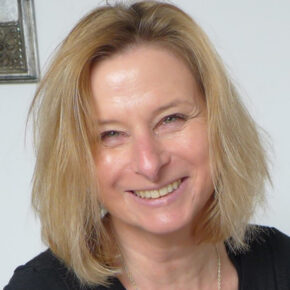Q – Hi Candida, and thanks for joining us. Seeing as you work at Myriad Editions, an independent publisher, what distinguishes the writers you take on as opposed to the larger publishing houses?
Candida Lacey – Glad to be here, and that’s a good question. Some of our authors could be and have been published by larger publishers.
In theory, smaller publishers have smaller overheads and can take more risks; in practice, we’re doing what every publisher, regardless of size, should be doing—looking for and creating opportunities to champion our authors.
Smaller publishers tend to have a more ‘hands-on’ approach to author care, not only in terms of editorial support but also in the ways we promote their work.
We don’t have the large marketing budgets that our corporate colleagues enjoy. We can’t buy table space in Waterstones, for example. We have to think more creatively and create these opportunities to promote and sell books.
Q – The literary fiction market is small (in commercial terms), but what would warrant a successful run in number of copies sold for a new voice in literary fiction?
CL – The market for literary fiction is small but the prizes are large. A few years ago I remember publishers only half-joking about the type of novel that always won the Man Booker Prize: historical, set in a foreign country with a profound love at its core.
The majority of literary fiction slips quietly under the radar, of course. We expect to sell 5,000 copies of a paperback to break even. If we sell US or translation rights, that gives us a head start.
Q – What do you look for in a debut writer?
CL – When you ask publishers what they look for, you often hear the same thing. It seems we’re all looking for an original voice, well-defined characters and a compelling plot.
Fortunately, this industry is all about taste. One editor will see promise in a manuscript or be swept away by a story that will leave another cold. This is why authors shouldn’t be deterred by rejections.
Always persist, keep looking for the right publishing home for your novel. And the right publishing home is where an editor truly loves your work.
An editor needs to feel passionate about a book because they are its best champion; an editor is the book’s advocate every step of the way, from sharing it with colleagues in-house to exciting sales reps, booksellers, festival programmers, reviewers and foreign publishers.
If I were a writer today, I’d try to seifcure a day job that wasn’t teaching creative writing.
– Candida Lacey
Q – If you were a writer trying to get published today, what steps would you take?
CL – If I were a writer today, I’d try to secure a day job that wasn’t teaching creative writing. Creative writing classes have grown to be a massive part of the industry, and many writers are making an income teaching that they can’t make from book sales or reviewing.
But we should also remember that T.S. Eliot was a banker. I have no scientific proof, of course, but just a hunch that some writers would better feed their creative energy by reading great literary fiction rather than other people’s manuscripts.
Q – Are there any dates in the works for this year’s First Drafts competition, as it sounds like a fantastic opportunity?
CL – We’ve run First Drafts for 9 years and we’re taking a break this year to find a sponsor to help us take it to a new level and reach a wider demographic of emerging writers.
As soon as we have a date for our next First Drafts competition, we’ll advertise it on our social media.
Whether or not an author has an MA shouldn’t influence whether or not the book is commissioned; we’re judging the writing, not the author’s CV.
– Candida Lacey
Q – Does having a master’s degree or similar qualification make you more likely to be picked up as an author?
CL – A master’s degree should not only make you more serious about your own writing but also make you a better reader.
It can give you the tools to analyse and understand what makes writing great as well as the ability to improve and hone your own skills.
But whether or not an author has an MA shouldn’t influence whether or not the book is commissioned; we’re judging the writing, the manuscript, not the author’s CV.
Q – What proportion of your published works come from recommendations, agents or the slush pile?
CL – We analysed our logs of unsolicited submissions a couple of years ago and found that most of the manuscripts we picked out and published had been submitted either by a writer who was recommended to us by one of our authors, or who had come to our notice through the First Drafts competition or had met us at a publishing event.
We have a few pickups from agents too. I think it’s surprising, and rather disappointing, that we haven’t yet found a hidden gem in the slush pile, but we’ll keep looking!
I’d say it’s about 50/50 between agents and author recommendations, as we take those recommendations very seriously.
When choosing publishers to submit your work to, start by looking at your own bookshelves or in a bookshop – which other books would sit happily next to yours? Check out those publishers.
– Candida Lacey
Q – What general advice would you give to someone looking to submit their manuscript?
CL – Your choice of publisher is incredibly important. Make sure you do some background research, and make sure your book would fit on the publisher’s (or agent’s) list.
When choosing publishers to submit your work to, start by looking at your own bookshelves or in a bookshop – which other books would sit happily next to yours? Check out those publishers.
Write to a publisher, editor or agent by name. If you’ve made a selection of comparable books, check the acknowledgements. Most authors will name their editor and agent.
If someone submits to Myriad with an email addressed to ‘Dear Sirs’, we know they’ve not taken the time to find out very much about us and this is a blanket submission to every publisher listed in a directory.
Writers are quick to complain about publishers ignoring their submissions or writing one-line rejections, but publishers receive hundreds of submissions every month, and most of these are simply unsuitable and not the right kind of book for that publisher.
If a writer goes to the trouble of telling us why they think we might be the right publisher, we will respond with equal consideration.
If you’re focused and you’ve researched who you’re submitting to, I think it’s fine to submit to both publishers and agents simultaneously – just let everyone know if you get picked up.
– Candida Lacey
Q – Would you say that it’s always best to get an agent when seeking publication, even with independent publishers?
CL – If you’re approaching independent publishers who accept direct submissions you don’t need to find an agent first.
Agents and publishers can be slow to respond, and I think it’s unreasonable to expect an author to send only to one or another.
If you’re focused and you’ve researched who you’re submitting to – publishers and agents – I think it’s fine to do both. All we ask is that you let us know if you’ve signed with an agent since submitting your work.
Q – How important are covering letters compared to synopses?
CL – I find a good covering letter far more interesting than a synopsis.
A covering letter is an opportunity to explain what is special about your book, why it would fit with the publisher’s list, what has inspired your story, why you’re a serious writer etc.
A synopsis is formulaic and reduces even the most compelling story to a blunt series of bullet points.
Also, I think it’s important to give your whole manuscript the same attention you give to the first three chapters. I can’t tell you how many manuscripts we’ve received that fall apart by chapter four.
Q – Candida, this has been great. Thank you for your time.
CL – Thank you, and good luck!




